Stay Informed
Popular Articles
- Hiatal Hernia: Hidden Cause of Chronic Illness
- Small Intestinal Bacterial Overgrowth (SIBO)
- Applied Lymphology: Unlocking the Secret to Pain Relief
- An Introduction to Constitutional Iridology
- The Low Down on Liver Detoxification
- An Energetic and Emotional Approach to Cancer
- Fat Facts
- Marrow in the Bones
- Blood Type and Nutrition
- Cardiac Herbs: Beyond Hawthorn
Quick Search
The School of Modern Herbal Medicine




Singing the Health Food Store Blues in 2016
- 2/23/2016
- Categorized in: General Health
 My interest in the natural health movement started back in the 1970s. At that time, there were health food co-ops in many cities across the United States. You'd join the co-op by paying a monthly fee and get a discount on the products they offered. If you volunteered to help out at the co-op for a few hours every month, you'd get an additional discount.
My interest in the natural health movement started back in the 1970s. At that time, there were health food co-ops in many cities across the United States. You'd join the co-op by paying a monthly fee and get a discount on the products they offered. If you volunteered to help out at the co-op for a few hours every month, you'd get an additional discount.
For the short time my wife and I lived in Spokane, Washington, we belonged to a food co-op—our first co-op experience. They had a monthly newsletter where I first learned that refrigerating tomatoes caused them to lose flavor. Later, we participated in food co-ops in Ft. Collins, Colorado and Provo, Utah. In fact, the guy who started the co-op in Provo was a friend, who I encouraged to start the co-op when he told me he was thinking about it.
The co-ops gradually gave way to health food stores. Most of the early health food stores I saw primarily sold supplements (like GNC). I could never figure out why they called them health “food” stores because they hardly had any food. However, I started to see stores appearing that actually focused on carrying food.
In the early 90s, a guy opened a nice little health food store on 2nd Avenue in Salt Lake City, not too far from where I grew up. I became friends with him and we were on a radio talk show together talking about the importance of eating whole foods for nutrition. I watched his small health food store grow into a chain of three or four health food stores. (He even opened one in Flagstaff, AZ.) Later, he was bought out by Wild Oats, as were many other small health food stores and co-ops across the country. Wild oats was eventually bought out by Whole Foods and most of the small health food stores have disappeared, being turned into large chain stores.
Today, there are many organic and natural foods at local grocery stores, but I do a lot of my shopping at the local Natural Groceries and ocassionally go across town to the Real Food Store, which has raw milk and cheese. When I'm down in Las Vegas I almost always visit Whole Foods, too.
Missing the Old Co-Ops
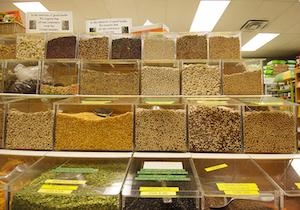 However, all these chain stores have a different feeling than those early co-ops and health food stores. They didn't have the “glitz” and “commercial” feeling of these big modern chains. They were an outgrowth of the hippie movement of the 60's and had a rustic, back-to-nature, back-to-basics feeling about them—anti-establishment and anti-big corporations. They typically featured barrels of whole grains and beans, jars of herbs, fresh fruits and vegetables, whole grain breads, soymilk, fresh juices and other fairly staple foods. They also had products like Bragg's vinegar, Dr. Bronner's soap and Bernard Jensen's Black Cherry Concentrate, but there weren't a lot of prepared or convenience foods in them. The new health food stores are big chains, and now big corporations are part of the “health food” movement.
However, all these chain stores have a different feeling than those early co-ops and health food stores. They didn't have the “glitz” and “commercial” feeling of these big modern chains. They were an outgrowth of the hippie movement of the 60's and had a rustic, back-to-nature, back-to-basics feeling about them—anti-establishment and anti-big corporations. They typically featured barrels of whole grains and beans, jars of herbs, fresh fruits and vegetables, whole grain breads, soymilk, fresh juices and other fairly staple foods. They also had products like Bragg's vinegar, Dr. Bronner's soap and Bernard Jensen's Black Cherry Concentrate, but there weren't a lot of prepared or convenience foods in them. The new health food stores are big chains, and now big corporations are part of the “health food” movement.
The people who ran these early businesses were seeking to return to a more basic and simple life. The guy who ran the health food stores in Salt Lake brought a bunch of friends from California to work with him on the project. They bought an apartment building, in which they all lived, and bought some acreage in south Salt Lake to start their own organic farm to grow produce for their own stores.
Is it Really Health Food?
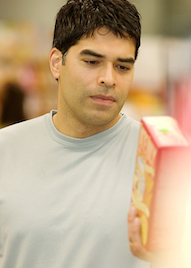 I remember going into the health food store in Salt Lake after Wild Oats had taken over. The first thing I noticed was that all of the whole grain breads had been replaced with products mostly made with “organic, unbleached white flour.” I asked one of the managers why there weren't more whole grain breads. “There isn't enough consumer demand,” he told me. “We have to educate people to want them, because what most people want is the white breads.”
I remember going into the health food store in Salt Lake after Wild Oats had taken over. The first thing I noticed was that all of the whole grain breads had been replaced with products mostly made with “organic, unbleached white flour.” I asked one of the managers why there weren't more whole grain breads. “There isn't enough consumer demand,” he told me. “We have to educate people to want them, because what most people want is the white breads.”
I wondered about this, seeing that the previous health food store ONLY sold whole grain breads and had been steadily expanding. So, I don't think the change had anything to do with consumer demand for organic white bread. It was just the effort of a large corporation to appeal to a larger market segment.
Today's health food stores are a hybrid of “health food store” and “gourmet grocery store.” We've moved from the locally-supported co-op, where you got to know other like-minded people by working with them to meet your co-op work requirement, to the impersonal world of big corporate business. This also means that I have to read the labels carefully, something I didn't have to do 20 years ago.
Lost Ideals
 The consciousness has shifted as well. Health food is now “big business,” and that concerns me. It's not that I'm unhappy that mainstream America is becoming more health conscious. I'm delighted that the local Harmon's grocery store has a large “health food” section, carries lots of organic produce, recently opened an in-store bakery that makes tasty breads with organic flour and even has a lovely salad bar. I can now purchase lots of items here in Saint George (like organic Rainbow chard) which I used to get at Whole Foods or Wild Oats in Las Vegas to obtain. However, as “health food” moves mainstream, I also watch the steady erosion of the ideals on which this movement was founded.
The consciousness has shifted as well. Health food is now “big business,” and that concerns me. It's not that I'm unhappy that mainstream America is becoming more health conscious. I'm delighted that the local Harmon's grocery store has a large “health food” section, carries lots of organic produce, recently opened an in-store bakery that makes tasty breads with organic flour and even has a lovely salad bar. I can now purchase lots of items here in Saint George (like organic Rainbow chard) which I used to get at Whole Foods or Wild Oats in Las Vegas to obtain. However, as “health food” moves mainstream, I also watch the steady erosion of the ideals on which this movement was founded.
This is particularly evident when I go to the Whole Foods Expo, something I've been doing most years since 2002. The Expo has no relation to Whole Foods Markets—it is a trade show for health food stores. They feature speakers and thousands of booths offering organic food, vegetarian food, herbs, supplements, personal care products, pet products and other items that cater to the “health food” market. It is held in Anaheim each spring and Baltimore each fall. (If you've never been to one, you should go. If you own a shop, it's free to register.)
I like to check out what's happening in the industry, what the latest fads and trends are, and to look for interesting new products. Every year I find at least one item that catches my interest. I also bump into some old friends from time to time and make new ones. I confess that my main reason for attending is to sample the food. I never need to eat lunch when I'm at the Expo. I just head over to the food area and start “grazing.” There are samples of grass fed beef, all-natural chicken, organic ice cream, vegetarian foods, vegan foods, food bars, chocolate bars, teas, salsa, chips, drinks, soups, cheeses, breads and of course, prepared entrees.
Trends that Bother Me
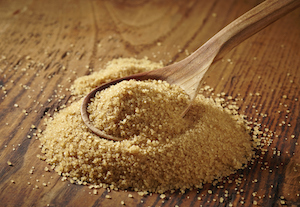 I'm starting to see a trend. Big food manufacturers are starting to jump on the health food bandwagon. "Organic" is a got trend. Even Wal-Mart carries organic food. Frito-Lay has a line of organic chips. These are just a few examples, but now that organic is big business, I trust it less.
I'm starting to see a trend. Big food manufacturers are starting to jump on the health food bandwagon. "Organic" is a got trend. Even Wal-Mart carries organic food. Frito-Lay has a line of organic chips. These are just a few examples, but now that organic is big business, I trust it less.
I don't know why I'm gifted to be able to see trends, but maybe it's just because I keep my eyes open. For instance, I knew that as soon as the Federal government took over the organic certification that the organic movement was going to be “watered down.” Major food manufacters want all kinds of things approved as "organic" that aren't and their powerful Washingon lobbies push for this sort of thing. Plus, it's very easy for big corporations to pay regulators to “look the other way” for minor infractions of the regulations.
But, that's not the big problem I see with the big-business organic movement. The real problem is that "organic” and “natural” are now being used to make highly processed convenience foods appear to be healthy. It's amazing to me how many “health foods” contain organic white flour, organic refined sugar and even chemical ingredients like sucralose. The organic movement also features lots and lots of highly processed convenience foods.
Recently I realized how much I had succumbed to this trend. I started to look at how many health food store products contain refined sugar and realized that many of the foods I buy from the health food store really aren't that healthy. So, I want to clarify a few things so people aren't misled. Here are four points to consider when looking for healthy food.
1. Complex Carbohydrates are Healthy, Refined Carbohydrates are Not, Even if They are Organic
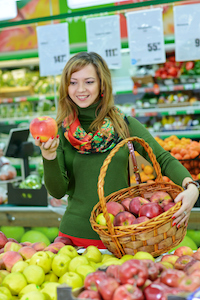 The good part of all this is that good sources of complex carbohydrates--organically grown fruits and vegetables and whole grains and beans are now readily available. These are the carbohydrates we need, particularly the fruits and vegetables.
The good part of all this is that good sources of complex carbohydrates--organically grown fruits and vegetables and whole grains and beans are now readily available. These are the carbohydrates we need, particularly the fruits and vegetables.
But, let's get real. Have refined sugar, white flour and white rice suddenly become healthy just because they were made from organically-grown whole wheat, sugar cane or beets or brown rice? Of course not!
Organic agriculture isn't just about growing food without pesticides and other chemicals; it's about learning to work in co-operation with nature instead of fighting nature. Organic agriculture is about building up the health of the soil so that the foods grown on them will have more nutritional value. Our health begins with the health of the soil, which creates health in the plants and animals raised on that soil, which, in turn contributes to our health as we consume these healthy plants and animals.
One loses most of the benefit of this organic food when it‘s processed to strip away its nutritional content. So, don't be duped. It's not that having a little unbleached wheat flour or white rice once in a while is going to kill you. It isn't. But, I still favor my whole grain flours, natural sugars and brown rice for regular use, and so should you if you're interested in good health. We need whole foods, not just chemical-free foods.
2. The More Processed a Food is, The Less Nutritional Value It Provides Us
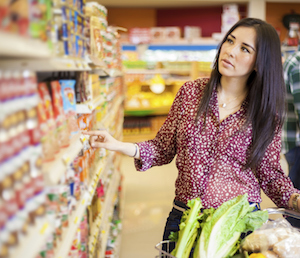 Obviously, this is an extension of the “complex carbohydrate” discussion, but what I'm talking about here is convenience foods. As I mentioned, there is a huge trend in the health food and organic movement towards convenience foods. I understand, we all have busy lives and sometimes we just don't have time to prepare meals.
Obviously, this is an extension of the “complex carbohydrate” discussion, but what I'm talking about here is convenience foods. As I mentioned, there is a huge trend in the health food and organic movement towards convenience foods. I understand, we all have busy lives and sometimes we just don't have time to prepare meals.
While I'm very glad that I can get healthier versions of some convenience foods, I don't make the mistake of thinking these convenience foods are the optimal route to health. I like tomato soup, but rarely have time to make my own, so I'm glad I can buy Pacific's Creamy Tomato or Roasted Tomato and Red Pepper, instead of canned condensed tomato soup. However, we need to keep in mind that all processing does result in some nutritional loss. So, if we freeze, can or dry a food it suffers some nutritional loss. Since food has to be preserved some way, we put up with some loss.
However, when they make pre-packaged meals, they are starting with foods that have already been preserved through freezing, canning or drying and mixing them into a meal which is then processed again by freezing, canning or drying. So, we've lost nutritional value a second time. The truth is, that pre-packaged meals will never be quite as healthy as meals we make ourselves, but I also realize that we live in a busy world and if we must use convenience foods, it's nice that we at least have more convenience foods made with healthier ingredients.
Still, if you take these foods and heat them in the microwave, then you're going to lose nutritional value again. It's sad that people don't realize how much damage microwaves do to the nutritional value of food. For example, I saw a booth at the Expo promoting fresh, organically grown baby food. This baby food hadn't been processed through canning. It was refrigerated and fresh. However, the booth was advertising, “Just warm it in the microwave.” In other words, take this really healthy food and “nuke” it to kill some of its nutritional content before feeding it to your kid. We still have a lot of educating to do.
3. Fresh is Best, Which Means That Sometimes Locally-Grown May Be Healthier Than Organically-Grown
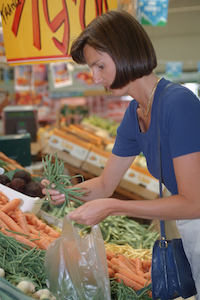 One of the problems the small co-ops and early health food stores sought to address was the environmental issues surrounding our food supply. For instance, why do we ship Florida oranges to California and California oranges to Florida? There is a lot of pollution and energy waste generated in this process of moving food around. It also means that the “fresh” produce sitting in the supermarket, really isn't that fresh. Most likely it's about 14 days old. That's the average time it takes for the average produce item to reach the supermarket shelf after it has been picked.
One of the problems the small co-ops and early health food stores sought to address was the environmental issues surrounding our food supply. For instance, why do we ship Florida oranges to California and California oranges to Florida? There is a lot of pollution and energy waste generated in this process of moving food around. It also means that the “fresh” produce sitting in the supermarket, really isn't that fresh. Most likely it's about 14 days old. That's the average time it takes for the average produce item to reach the supermarket shelf after it has been picked.
For some foods, like apples, squash, potatoes, onions, etc. this isn't much of an issue. These foods store well, and so they ship well. However, for many fresh fruits, tomatoes, peas, green beans, lettuce and other more fragile foods, this means there is a lot of nutrient-loss during shipping. There is also a loss of flavor. In the case of fruits like apricots, peaches and tomatoes, the only way these foods can be shipped is if they are picked green. This means they never had the chance to develop their proper flavor. Plus, varieties are selected based on what ships the best, not what tastes the best.
This loss of flavor is one reason why I believe many people don't eat more fresh fruits and vegetables. It's one of the big reasons I like to grow a garden. I've planted carrots, beets, onions, parsnips, turnips, spinach, lettuce, radishes, chard, green beans, zucchini, cucumbers, cantaloupe, pumpkins, Jerusalem artichokes, shallots, potatoes, corn, tomatoes, bell peppers, rhubarb, egg plant, tomatos, peppers and potoatoes. Not everything has grown well, but it's fun to try anyway.
I haven't sat down and put pencil to paper, but considering all of the money I've spent on fertilizers, compost, equipment, irrigation supplies, plants and seeds, I'll probably wind up spending more growing my own food than I would purchasing it at the grocery store. However, I can't buy food as as good as what I grow at the grocery store. You can find really fresh produce at Farmers' markets, but unless they are stocking locally grown produce, it's rare to find really fresh produce at the grocery store.
A fresh-picked tomato, or green pepper or carrot or green bean from my own garden tastes completely different than anything I can buy at the grocery store. Plus, I love to grow varieties that you don't often see at the grocery store. I've planted 11 varieties of potatoes, four varieties of carrots (orange, red and yellow), three varieties of beets (yellow, red, and red and white striped) which are all doing well.
The bottom line for me is this—if I have my choice between locally grown, conventional produce and organically-grown produce that's been shipped half-way across the country, I'll buy locally-grown and wash it to remove pesticide residues. You don't know what produce is supposed to taste like if you haven't eaten it right after it's been harvested. Thankfully, some local farmer's markets have sprung up, too, which I like to shop at for really tastey food I can't grow.
4. Home-Cooked Food is Better than Pre-Packaged Foods
 By now, this should be obvious, but I wish to reinforce the concept by telling you a little about my personal experiences. I love to cook. I never grew up, so I still like to “play” with my food. Chopping vegetables, mixing up a cake or cookie dough and other kitchen activities are fun for me.
By now, this should be obvious, but I wish to reinforce the concept by telling you a little about my personal experiences. I love to cook. I never grew up, so I still like to “play” with my food. Chopping vegetables, mixing up a cake or cookie dough and other kitchen activities are fun for me.
However, for a time, I just didn't have time to do much cooking. So, I relied on more convenience foods. I did buy these convenience foods as much as possible from the health food store or at least the health food section of my grocery store. And, even though I was eating healthier versions of these convenience foods, I still didn't have the energy that I did when I was fixing my own food. The same thing happens when I travel and have to eat in restaurants—I notice a drop in my health and energy levels.
Recently, I've decided that enough is enough. I decided I didn't care if it takes extra time—I was going to start fixing more fresh food, and I did. I broke out the juicer and started making fresh fruit and vegetable juices instead of drinking the bottled ones. I've made my own stock and made soups in a crock pot. I've steamed more fresh vegetables. I've packed my own lunches instead of eating out. And, as I previously indicated, I've been expanding my garden, which is giving me both fresh food and exercise.
Whenever I do this, my energy is better. My mental clarity is better. And I just feel better overall.
But, there is another thing I notice. It's a more subtle, perhaps even spiritual benefit—a greater sense of connection with the food I'm eating. Food preparation for me is an act of love. If you believe in the intangible (as I do), then there is a subtle energy in a home-cooked meal that was lovingly prepared that's different from something made in a factory.
That sense of relationship is even deeper when I've grown the food myself. When I pluck a fresh carrot from my garden, I not only get food of a quality that I cannot buy, I also have a sense of connection to the forces that produced my food—the earth, the water, the sun. For me it is a “rich” feeling to harvest food my own garden, a sense of “wealth” greater than a high balance in my checking account. I just don't get the same feeling when I open a can. (The exception to that being opening a jar of food I bottled myself.)
I feel sorry that so many people in our society are missing the wonderful feeling of satisfaction that comes from growing, harvesting and preparing fresh food. It's not just healthier for the body, it's healthier for the soul.
Make Healthy Food a Financial Priority
 Many people look at the increased cost of “health food” and feel they just can't afford it. Well, if they are looking at convenience foods, that is a valid issue. However, if they would stop buying the soda pop, chips and other processed convenience foods and just purchase fresh fruits and vegetables and bulk grains, beans and nuts from the regular grocery store, they would save money on groceries and be eating healthier as well. They should just wash the fruits and vegetables in a little Sunshine Concentrate or Dr. Bronner's Supermild Baby Soap (or something similar) to remove pesticides.
Many people look at the increased cost of “health food” and feel they just can't afford it. Well, if they are looking at convenience foods, that is a valid issue. However, if they would stop buying the soda pop, chips and other processed convenience foods and just purchase fresh fruits and vegetables and bulk grains, beans and nuts from the regular grocery store, they would save money on groceries and be eating healthier as well. They should just wash the fruits and vegetables in a little Sunshine Concentrate or Dr. Bronner's Supermild Baby Soap (or something similar) to remove pesticides.
Once, when I was having serious financial issues, I had to get assistance from my Church. The food was mostly refined and our health suffered eating it. As soon as our financial situation improved, the first thing I did was to go out and purchase some regular (non-organic) fruits and vegetables. As soon as we started eating those, I felt better, had more energy and was able to work harder and think more clearly about how to improve our situation. Since that time I've always made eating health a high priority in my budget.
If time is a problem, buy a vegetable steamer and a crock pot. They are great investments for being able to prepare healthy meals without spending a lot of time in the kitchen. Many times, I've put various chopped vegetables and some meat into a crock pot in the morning to come home to a tasty soup in the evening. You can also soak beans overnight, then rinse them the next morning, add some veggies or meat and let them cook through the day. Again, you'll come home to a healthy, ready-to-eat dinner.
With the vegetable steamer, you can cut up your veggies, set the timer on the steamer and work on other things. The steamer automatically shuts off and you have some perfectly steamed vegetables that are both tasty and healthy.
Eating these whole foods and preparing them yourself will save money for two reasons. First, these foods are much cheaper than prepared foods, and secondly, because you'll eat less. Whole foods are more satisfying and filling. But, there's an even bigger bonus—you'll have more energy and think more clearly, too. LIke I discovered, this will help you financially because you'll be able to be more creative with earning money and managing it, too. So, the bottom line is—you may actually be able to save money by eating healthy foods as long as you aren't going for the convenience items. Stick to the real food; the kind the old co-ops used to sell.
I guess there's really no reason for me to be “singing the blues” about the changes that have taken place in the “health food” industry. But, I do like to keep my eyes open and not blindly trust something just because the label says it's “natural” or “organic.” One thing hasn't changed since those early co-op days, however, and that is my firm conviction that whole, natural, properly grown foods are vitally important to our health and well-being. You just have to look closely to make sure you're getting the real thing.
